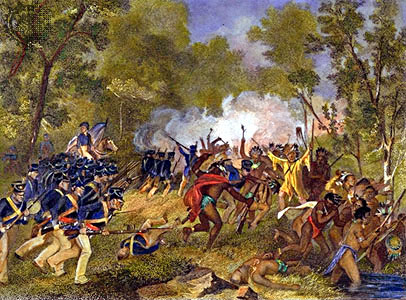
The Battle of Tippecanoe
The Battle of the Wabash
In the dead of the night, when aloud on the air,
Through darkness the war whoop was heard fiercely yelling.
Like lions just wild from the gloom of the lair
Our chiefs found their foe on their slumbers impelling:
Hid the savage from sight
Undismay'd were our warriors slain in the fight;
Then the laurel shall ever continue to wave
And glory thus bloom o'er the tomb of the brave.
Great Davies and Owen, bright offspring of Fame,
Rushed on to the battle, with bosoms undaunted;
And e're bearing death the dread rifle ball came
In the breast of the foe oft their weapons they planted,
Gallant chieftains adieu,
Tears your destiny drew,
Yet shall rise o'er your tombs neither cypress nor yew
Then the laurel shall ever continue to wave
And glory thus bloom o'er the tomb of the brave.
Long, Warwick, McMahon and Spencer and Baen,
And Berry, 'mid darkness , their banners defended;
But when day drew the curtain of night they were seen,
Covered o'er with the blood of the savage, extended!
Though Freedom may weep,
Where they mouldering sleep
Yet shall valour their deaths as a Jubilee keep,
While the laurel shall ever continue to wave
And glory thus bloom o'er the tomb of the brave.
Ye chiefs of the Wabash, who gallantly fought,
And fearlessly heard the dread storm of war rattle;
Who lived to see conquest so terribly bought
While your brothers were slain in the uproar of battle.
Still fearless remain,
And though stretched on the plain,
You shall rise on the records of Freedom again,
For the laurel shall ever continue to wave
And glory thus bloom o'er the tomb of the brave.
Ye sons of Columbia, when danger is nigh,
And liberty calls round her standard to rally;
For your country your wives, and your children to die,
Resolve on your foes, in stern valour to sally;
Ev'ry hero secure,
That his fame shall endure,
'Till eternity, time in oblivion immure;
For the laurel shall ever continue to wave
And glory thus bloom o'er the tomb of the brave.